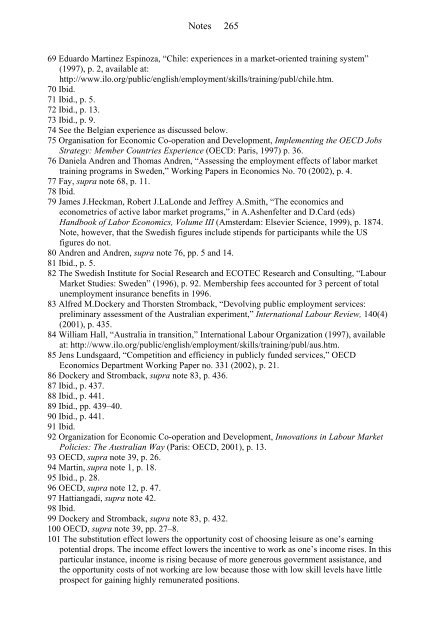Rethinking the Welfare State: The prospects for ... - e-Library
Rethinking the Welfare State: The prospects for ... - e-Library
Rethinking the Welfare State: The prospects for ... - e-Library
You also want an ePaper? Increase the reach of your titles
YUMPU automatically turns print PDFs into web optimized ePapers that Google loves.
Notes 265<br />
69 Eduardo Martinez Espinoza, “Chile: experiences in a market-oriented training system”<br />
(1997), p. 2, available at:<br />
http://www.ilo.org/public/english/employment/skills/training/publ/chile.htm.<br />
70 Ibid.<br />
71 Ibid., p. 5.<br />
72 Ibid., p. 13.<br />
73 Ibid., p. 9.<br />
74 See <strong>the</strong> Belgian experience as discussed below.<br />
75 Organisation <strong>for</strong> Economic Co-operation and Development, Implementing <strong>the</strong> OECD Jobs<br />
Strategy: Member Countries Experience (OECD: Paris, 1997) p. 36.<br />
76 Daniela Andren and Thomas Andren, “Assessing <strong>the</strong> employment effects of labor market<br />
training programs in Sweden,” Working Papers in Economics No. 70 (2002), p. 4.<br />
77 Fay, supra note 68, p. 11.<br />
78 Ibid.<br />
79 James J.Heckman, Robert J.LaLonde and Jeffrey A.Smith, “<strong>The</strong> economics and<br />
econometrics of active labor market programs,” in A.Ashenfelter and D.Card (eds)<br />
Handbook of Labor Economics, Volume III (Amsterdam: Elsevier Science, 1999), p. 1874.<br />
Note, however, that <strong>the</strong> Swedish figures include stipends <strong>for</strong> participants while <strong>the</strong> US<br />
figures do not.<br />
80 Andren and Andren, supra note 76, pp. 5 and 14.<br />
81 Ibid., p. 5.<br />
82 <strong>The</strong> Swedish Institute <strong>for</strong> Social Research and ECOTEC Research and Consulting, “Labour<br />
Market Studies: Sweden” (1996), p. 92. Membership fees accounted <strong>for</strong> 3 percent of total<br />
unemployment insurance benefits in 1996.<br />
83 Alfred M.Dockery and Thorsten Stromback, “Devolving public employment services:<br />
preliminary assessment of <strong>the</strong> Australian experiment,” International Labour Review, 140(4)<br />
(2001), p. 435.<br />
84 William Hall, “Australia in transition,” International Labour Organization (1997), available<br />
at: http://www.ilo.org/public/english/employment/skills/training/publ/aus.htm.<br />
85 Jens Lundsgaard, “Competition and efficiency in publicly funded services,” OECD<br />
Economics Department Working Paper no. 331 (2002), p. 21.<br />
86 Dockery and Stromback, supra note 83, p. 436.<br />
87 Ibid., p. 437.<br />
88 Ibid., p. 441.<br />
89 Ibid., pp. 439–40.<br />
90 Ibid., p. 441.<br />
91 Ibid.<br />
92 Organization <strong>for</strong> Economic Co-operation and Development, Innovations in Labour Market<br />
Policies: <strong>The</strong> Australian Way (Paris: OECD, 2001), p. 13.<br />
93 OECD, supra note 39, p. 26.<br />
94 Martin, supra note 1, p. 18.<br />
95 Ibid., p. 28.<br />
96 OECD, supra note 12, p. 47.<br />
97 Hattiangadi, supra note 42.<br />
98 Ibid.<br />
99 Dockery and Stromback, supra note 83, p. 432.<br />
100 OECD, supra note 39, pp. 27–8.<br />
101 <strong>The</strong> substitution effect lowers <strong>the</strong> opportunity cost of choosing leisure as one’s earning<br />
potential drops. <strong>The</strong> income effect lowers <strong>the</strong> incentive to work as one’s income rises. In this<br />
particular instance, income is rising because of more generous government assistance, and<br />
<strong>the</strong> opportunity costs of not working are low because those with low skill levels have little<br />
prospect <strong>for</strong> gaining highly remunerated positions.


